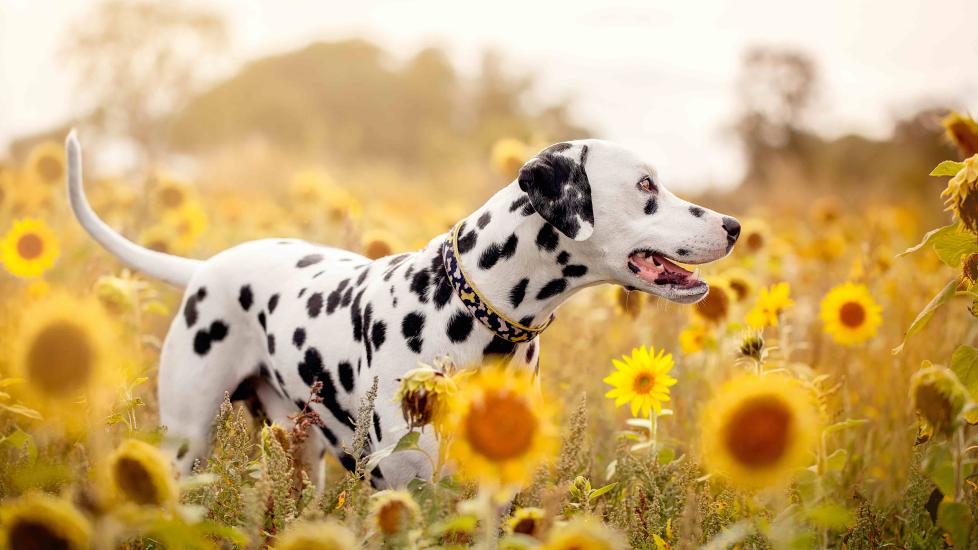Can Dogs Eat Sunflower Seeds?
Adobe Stock/Alexandra
If you’re munching on a bag of sunflower seeds and wondering if it’s OK to share a few with your pooch, you’re in luck: Dogs can eat sunflower seeds … with a few exceptions. Plain, shelled (meaning with the shell removed), and unsalted sunflower seeds are safe for healthy, adult dogs to eat. But you’ll want to be mindful of amounts and how they’re prepared.
Are Sunflower Seeds Good for Dogs?
Sunflower seeds—when prepared without salt or other additives—can be a great treat to share with your dog. Sunflower seeds contain vitamins and nutrients that are known to help improve dogs’ skin and coat. Though tiny, sunflower seeds are a good source of vitamin E, magnesium, protein, and fatty acids.
Whether given as a treat or as an addition to a balanced dog food diet, sunflower seeds can be a healthy little snack to share with your pooch. But not all sunflower seeds are the same. Only plain, shelled, unsalted sunflower seeds should be shared with your dog.
Vet Recommended Dog Food
Can Sunflower Seeds Be Bad for Dogs?
Some types of sunflower seeds are not good for dogs. Certain additives can make your dog sick, so only offer them plain varieties. The shells of sunflower seeds can also pose a choking hazard to your dog. Be sure to remove the husk before sharing or buy the seeds already shelled.
If your dog does get ahold of sunflower seeds still in their shell, watch out for signs of digestive distress. One or two likely won’t cause an issue if your dog is able to swallow them easily, but a few mouthfuls could cause an upset stomach or even an intestinal blockage.
Signs of an intestinal blockage include vomiting, lethargy/weakness, loss of appetite, and abdominal pain. Call your vet if you notice any of these symptoms after your dog eats sunflower seed shells, as your dog may need medical attention.
How To Safely Feed Your Dog Sunflower Seeds
Sunflower seeds can be a healthy addition to your dog’s diet, either as a treat or incorporated into their usual food. Before you offer your furry friend a sunflower seed snack, keep a few things in mind:
-
Only offer your dog plain sunflower seeds. Raw or toasted sunflower seeds are fine as long as they are unsalted and unseasoned. Under no circumstances should you offer spicy sunflower seeds (or anything spicy, for that matter) to your dog.
-
Shelled sunflower seeds are easier for your dog to digest. Whole/raw unshelled sunflower seeds (the kind still in the shell) should be avoided. You can purchase sunflower seed kernels already out of the shell or remove and toss the shells yourself before sharing with your dog.
-
Start slow and watch for any reactions. Try offering one or two sunflower seed kernels at first and monitor your dog in case of an upset stomach. If they’re OK after a few hours, you can share a few more.
How Many Sunflower Seeds Can a Dog Eat?
Even healthy treats like sunflower seeds should make up only 10% of your dog’s diet. The other 90% should come from a well-balanced dog food.
The following are just general guidelines for portion sizes for healthy, adult dogs. If your hound has any health issues or dietary restrictions, it’s best to talk to your vet before introducing a new ingredient to their diet.
-
Extra-small dog (2–20 pounds) = 1 teaspoon sunflower seeds per week (or less)
-
Examples: Yorkies, Chihuahuas, Pomeranians, Pugs
-
-
Small dog (21–30 pounds) = 2 teaspoons sunflower seeds per week (or less)
-
Examples: Basenjis, Beagles, Miniature American Shepherds
-
-
Medium dog (31–50 pounds) = 1–2 tablespoons sunflower seeds per week (or less)
-
Examples: Basset Hounds, Border Collies, Australian Cattle Dogs
-
-
Large dog (51–90 pounds) = 2–3 tablespoons sunflower seeds per week (or less)
-
Examples: Pit Bulls, German Shepherds, Labrador Retrievers, Australian Shepherds
-
-
Extra-large dog (91+ pounds) = 1/4 cup sunflower seeds per week (or less)
-
Examples: Newfoundlands, Bernese Mountain Dogs, Saint Bernards, Great Pyrenees
-
Other Foods to Feed Your Dog
If you’re looking to add a boost of protein and vitamins to your dog’s mealtime routine, sunflower seeds can provide that. But there are plenty of other kinds of human foods that dogs can enjoy safely, including:
-
Nuts, including peanuts, cashews, and almonds, can be a good source of protein and healthy fats.
-
Lean proteins like chicken, turkey, and salmon are good as a food topper or treat.
-
Plain, cooked vegetables, such as carrots, green beans, peas, and sweet potato cut into bite-sized pieces, are a healthy treat option.
-
Fruits including apples, blueberries, strawberries, mango, watermelon, and banana are a tasty dog-safe snack.
As with any new food, consult with your veterinarian before introducing new ingredients to your dog’s diet. They’ll be able to give recommendations tailored to your pet.
